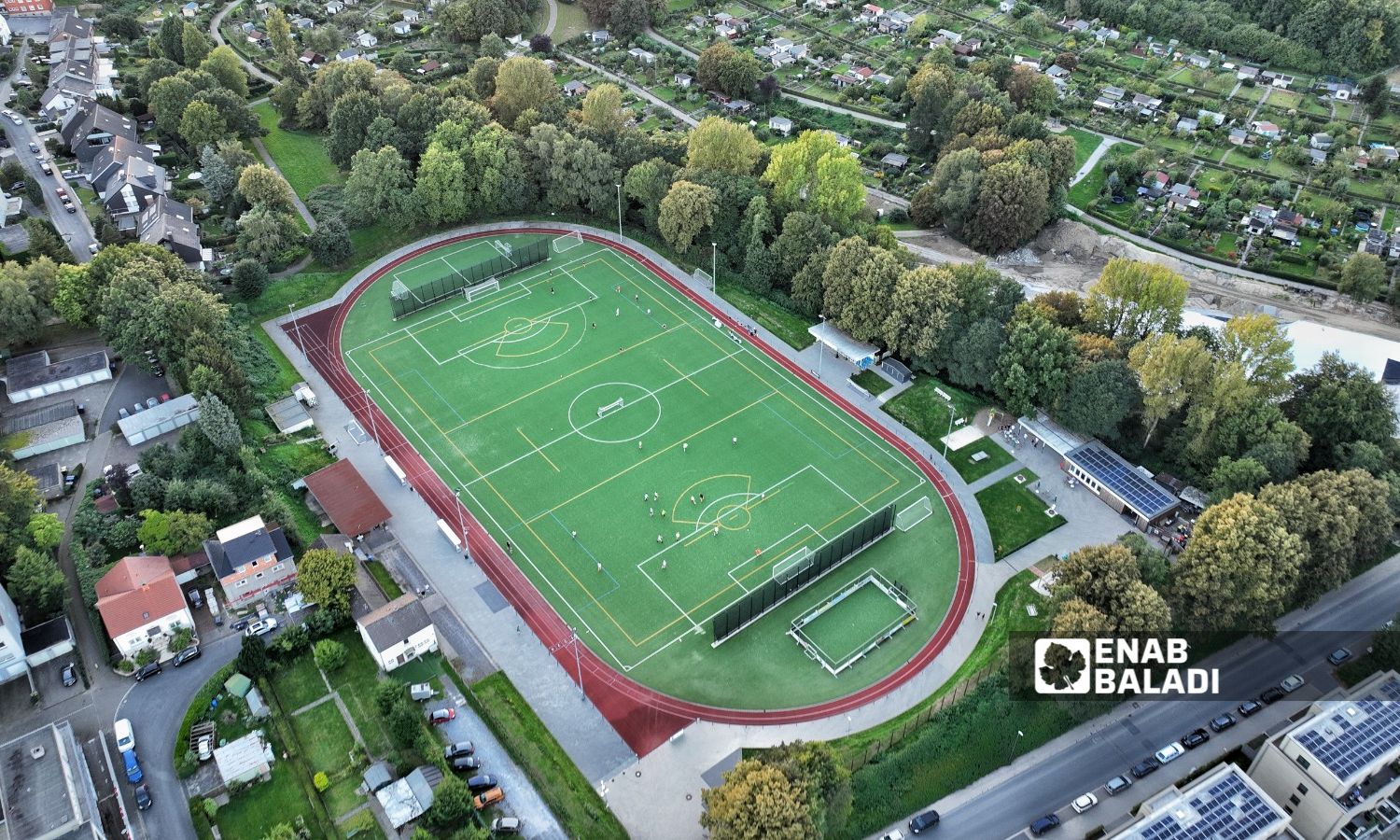Enab Baladi – Ali Darwish
Mohammad (26 years old) arrived in Germany in mid-2022 after a strenuous journey that lasted about two months, during which he traversed rugged smuggling routes through several countries.
Upon his arrival at the camp (refugee camps in Germany), Mohammad found spaces designated for exercising, along with some equipment and tools, a common feature in various refugee camps.
Although he did not commit to exercising due to physical exhaustion from his long journey, it wasn’t long before he registered at a gym after obtaining his one-year residence permit.
Mohammad told Enab Baladi that his love for sports wasn’t the chief reason for signing up at a gym; there were multiple reasons related to the refugee situation during the initial months of their arrival, both physically and psychologically.
Turning to sports
A few months after arriving in Germany, Mohammad began to feel sluggish and gradually experienced a decline in activity due to lack of movement, commuting, and not being engaged in employment.
The only solution he saw was to exercise, especially since refugees typically stay in the camp for at least a month and a half to two months, depending on the city or region, before moving to temporary accommodation. This period can extend for two years or more while they follow up on their asylum request and commit to learning the language, without being allowed to work full-time.
If he chose to work full-time, the support allocated for his language learning and other related governmental or organizational procedures to secure a job opportunity would cease.
Mohammad found that most of his peers at his place of residence were suffering from similar issues due to several factors, including staying up late, excessive smoking and hookah use, and eating unhealthy food.
Adding to this is the lack of movement and weak social relationships with the new lifestyle, all of which contribute to weight gain or creating a state of depression.
Karam al-Sankari, a Syrian bodybuilding trainer in Sweden, mentioned to Enab Baladi several reasons that motivated Syrian refugees to turn to various kinds of sports, including combat sports, swimming, bodybuilding within a gym, and even cardio and aerobic exercises.
The overall environment surrounding the refugee and the community imposes on them the practice of sports since European societies, in general, have a culture of health and fitness, which “enhanced the health culture already present in our Syrian culture,” according to al-Sankari.
Basel Namera, a psychological and physical expert and former coach of the Syrian national team for physical preparation, said to Enab Baladi that there is a segment of refugees who practiced sports to gain acceptance from the host society psychologically, as western society values a fit body, prompting some refugees to feel the need to build their bodies.
The lack of social relationships is also a primary reason since this aspect varies significantly between Europe and Syria. Therefore, when an individual goes to the gym, they meet new people, potentially broadening their life’s scope on various levels, according to al-Sankari.
Additionally, the general youth affinity for sports plays a role; when a young person arrives in Europe, they find that they have the economic capability to afford the monthly gym subscription and the necessary food for muscle building.
Al-Sankari compared his situation in Syria to that in Sweden, stating that he used to work in transporting building materials (sand, blocks, etc.) to cover his family’s expenses and allocated part of his salary to secure bodybuilding requirements.
While in Europe, he found that the space was open for practicing sports, life became easier, and he had the ability to secure all necessities.
Awareness of the importance of sports
Mohammad represents a segment that found in sports a breather for them, especially during the first year of their arrival in Europe.
According to psychological consultant Basel Namera, who oversees psychological counseling cases for refugees in Europe, a segment of refugees was aware of the importance of maintaining physical well-being, whether upon arrival at the camp by exercising within it or after obtaining residence and turning to study or work.
From a psychological perspective, a segment of young people was aware that committing to sports would alleviate the pressures of refuge and loneliness, especially for those who came alone without their families.
Namera pointed out that adhering to a sports program allows individuals to build social relationships within the gym community, with some of these relationships growing, which significantly alleviates life pressures.
Additionally, some refugees who excessively smoked cigarettes and hookah, consumed harmful substances, or frequently ate unhealthy foods found that sports could eliminate these habits or steer them towards a healthier lifestyle, according to trainer al-Sankari.
Al-Sankari noted that the improvement in the psychological state of the Syrian and Arab refugees he trained led them to bring their friends to training.
Over time, young men encouraged their friends to come to the gym, resulting in a group of Arab and Syrian youth training together and building mutual friendships.
Al-Sankari also mentioned that gyms are not just a refuge for males; there are sport clubs in Europe with designated areas for women, encouraging Syrian and Arab women and girls to attend.
Regular physical activity is a crucial factor in reducing symptoms of depression and anxiety, preventing cognitive decline, improving memory, and enhancing brain health, according to the World Health Organization.
Additionally, regular daily exercise can help overcome psychological stress.
Varying commitment
People’s commitment to exercise and continuing to attend gyms varies depending on the proximity to their workplace or residence.
Trainer al-Sankari said that a person’s commitments significantly impact their persistence in sports. However, there are easier options for exercising without a gym if one is motivated and has a healthy culture.
In Sweden, for instance, there are designated running paths where individuals can run or brisk walk.
There are also various exercise machines available in parks and near lakes, such as push and pull devices, enabling the practice of cardio and aerobic exercises commonly performed by citizens in European countries.











